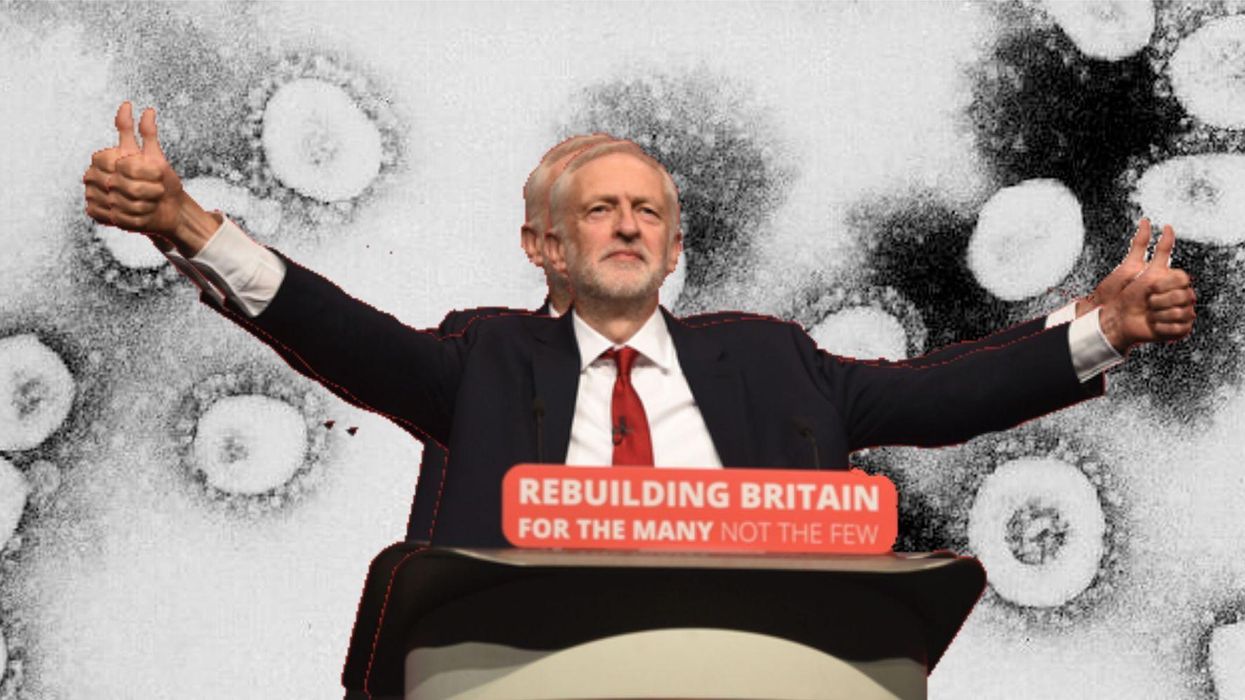News
Moya Lothian-McLean
Mar 23, 2020

Strange times make for strange sights.
Like the Conservative Party abandoning their normal fiscal policy of limited state intervention in order to prop up the entire economy with a range of measures that wouldn’t be out of place in Denmark… or in a Labour manifesto.
It’s making some onlookers question what other Labour Party policies might have proved uniquely useful in these testing times.
In fact, one Tory source was reported to have told ITV’s Robert Peston that they would be “implementing most of Jeremy Corbyn's programme” during the crisis.
Right then.
If the Tories need any extra ideas for what to prioritise, a quick flick through Labour’s 2019 manifesto provides more than a few suggestions about policies that would be extremely helpful during a pandemic.
1. National Care Service
What is it?
One of Labour’s major 2019 announcements was their wish to introduce a National Care Service, providing free, personal care for all older people who required it. The policy, which they costed at £6bn and said would be funded through corporation taxation, would also end the use of zero-hour contracts for carers and ensure a living wage.
This was designed to reduce the burden falling on unpaid carers (who number about seven million in the UK) and the NHS, which often has to care for older people who are technically fit but need care support that’s not forthcoming elsewhere
Why would this help?
The elderly are one of the groups most at-risk from coronavirus – but they still need care at the same time as being protected. The result is many private companies providing care for older people are “struggling”, especially as local councils – who cover the costs of care – only pay for hours delivered after the fact. £8bn has been cut from council social care budgets since 2014, leaving 1.4 million elderly people without help.
Meanwhile, the NHS is freeing up 15,000 beds for the predicted onslaught, which means discharging many elderly patients who are “medically fit to leave” but require social care. It’s not hard to see how a National Care Service may have come in very handy in bearing the strain now being placed on the increased need for specialist care for the elderly.
2. Funding for NHS
What is it?
Money… for the NHS. Labour wanted to increase spending on the NHS by 4.3 per cent a year – about £3.2bn more spent on the service by 2023 than the Tories outlined at the time. Much of this extra money was intended to fill the 106,000 staff vacancies and invest in new buildings, equipment and training for doctors and nurses.
Why would this help?
Given doctors say coronavirus could “overwhelm” the NHS in weeks, thanks to bed shortages, lack of equipment (including a shortage of ventilators) and a need for staff so pressing they’ve asked 65,000 retired medics to come back (who face the biggest threat from the disease, given many are over 65), it’s bittersweet to think of how a fully funded NHS might be dealing with this crisis.
3. Free broadband
What is it?
Full-fibre, free broadband for the whole country, by 2030. Only 7 per cent of UK premises have full-fibre connections. In comparison, that figure is 99 per cent in Japan.
Why would this help?
This policy was heavily derided by those in the centre and on the right. But funnily enough, now the majority of the population are being asked to spend a lot of time, including working hours, in their home, certain centrist voices are now loudly calling for… free broadband.
4. Right to Food
What is it?
A policy aimed at ending food insecurity. Labour said they would halve food bank usage during their first year in office and set up a £6m Access to Food Fund which would be used to develop “local community food plans”. This money would help improve local food services, like community gardens and shops.
Why would this help?
With stockpiling meaning unprecedented empty shelves in major supermarkets (although note: there is no shortage, just increased demand on supply lines), people with the highest risk of experiencing food insecurity are the ones most likely to suffer as a result of basic items like pasta and bread being out of stock. Having a dedicated system to ensure everyone has access to food and community sources for it would go a long way to preventing this – and removing the reliance on food banks which are buckling under the weight they’re being asked to bear.
5. End of Universal Credit
What is it?
Labour wanted to scrap Universal Credit, the controversial benefit system brought in at the end of 2019, which has been criticised for pushing people into poverty during five week waits for payments. But they said while a replacement system was being developed, they would make sure first-time claimants got interim payments, ending the five-week wait, while also getting rid of the two child limit and benefit cap, which the Institute for Fiscal Studies said would leave 100,000 households with an extra £2,000 a year.
Why would this help?
Interestingly, the Tories themselves have just increased Universal Credit (only by about £20, don’t get too excited) as part of the new measures to combat the economic impact of coronavirus, given unemployment is predicted to rise by 2 per cent across the UK. They’ve also suspended the Minimum Income Floor, which can lead to people being awarded less UC based on fluctuating incomes. But in short: more money to support those who need it? Seems like a no-brainer.
6. Ban zero-hours contracts
What is it?
Making sure workers had secure employment was a central commitment in the Labour manifesto and banning zero hours contracts was a key part of that. They wanted to make sure anyone working regular hours for more than 12 weeks had the rights to a standard employment contract. They also promised that cancelled shifts would be paid and that employers would have to give proper notice for changes in hours.
Why would this help?
Ensuring that the 896,000 people on zero-hours contracts had the right to regular employment contracts would mean they were covered by the new measures announced by Chancellor Rishi Sunak to protect employers on the PAYE system. The requirement of pay for cancelled shifts would also have made sure that many workers left high and dry by companies would have at had immediate security of pay cheques they’d been counting on.
7. Collective income protection
What is it?
An easily missed note in the manifesto, this one’s for the self-employed. Labour proposed a collective income protection insurance scheme, which basically helps provide income to people when they’re unable to work for long periods.
Why would this help?
Hmm, now how on earth could a scheme that helps pay people when they can’t work for an extended period be useful at a time likes this?
8. £10 minimum wage
What is it?
A “real” living wage, as calculated based on actual living costs vs income.
Why would this help?
Well, it means workers would hypothetically have more income to be reimbursed under Rishi Sunak’s plans to fund 80 per cent of wages. Plus, those having to seek new employment would probably be safer in the knowledge they would be getting at least £10 p/h minimum, whatever the work.
9. Free childcare
What is it?
Labour proposed extending 30 hours of free childcare to all children aged two to four, and reopening 1,000 SureStart centres (children’s centres in deprived areas) across the country. They also said they’d subsidise additional childcare hours needed.
Why would this help?
Childcare has become a central question of the coronavirus crisis, as schools and nurseries shut. Key workers have raised concerns about childcare costs and some nurseries have asked parents to pay towards the cost of childcare they would have been receiving, in order to "reserve" the child’s place when they reopen. So a certain amount of free childcare for all, supported by the government, is looking pretty smart.
10. Free TV licences for over-75s
What is it?
Labour promised to save the free TV licence benefit for over-75s the BBC has said they are going to scrap, in cost-saving exercises.
Why would this help?
There’s a lot of over-75s at home right now… In fact, this idea is so good that the BBC themselves have paused the new charges for 3.7 million people until August, as now is apparently “not the right time”.
Well, wasn’t that a fun and not-at-all-incredibly upsetting exercise in imagining what could have been!
Top 100
The Conversation (0)













